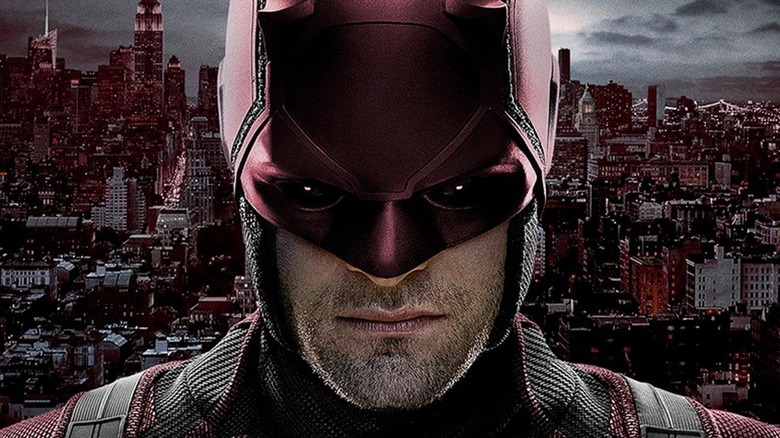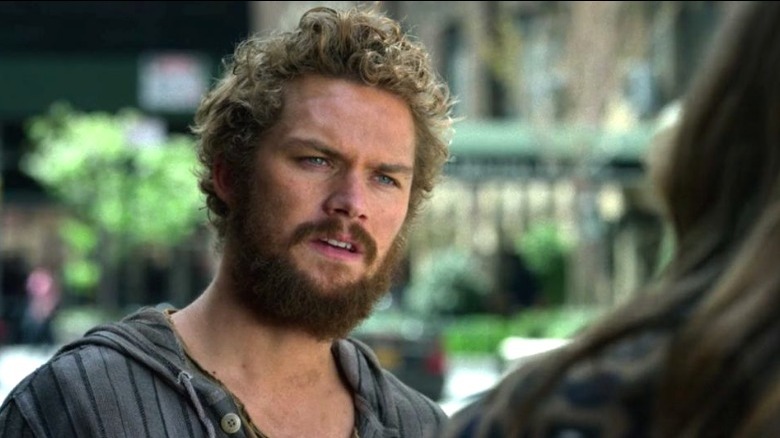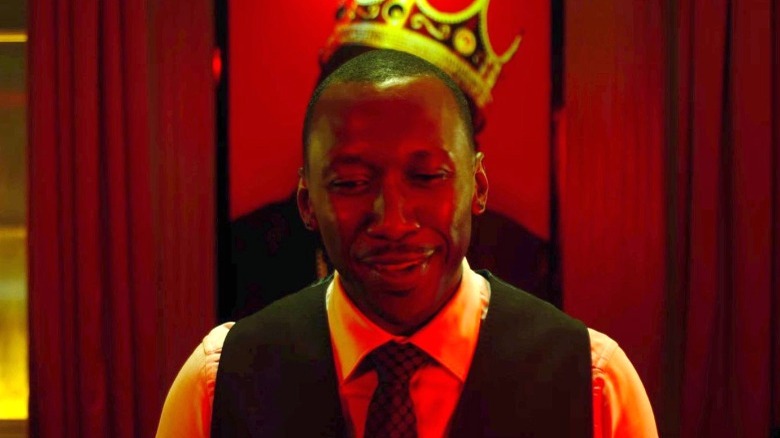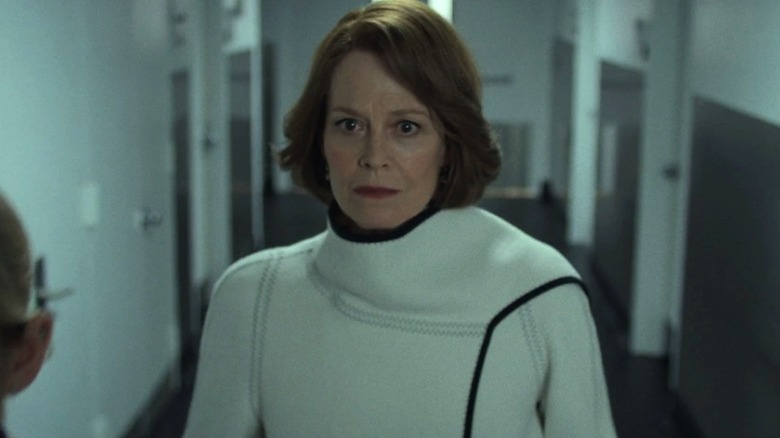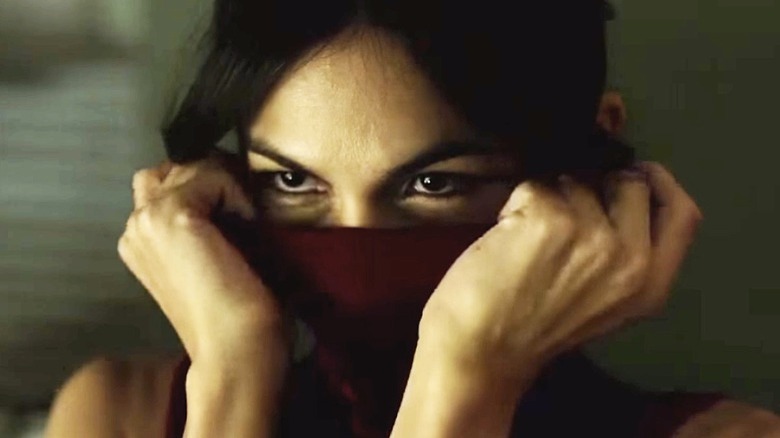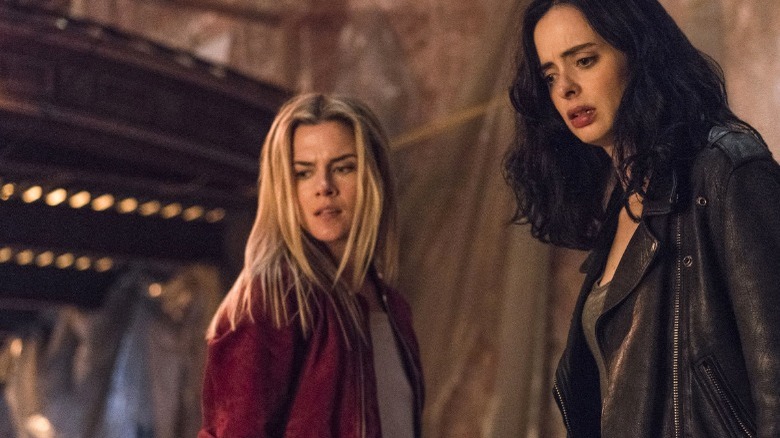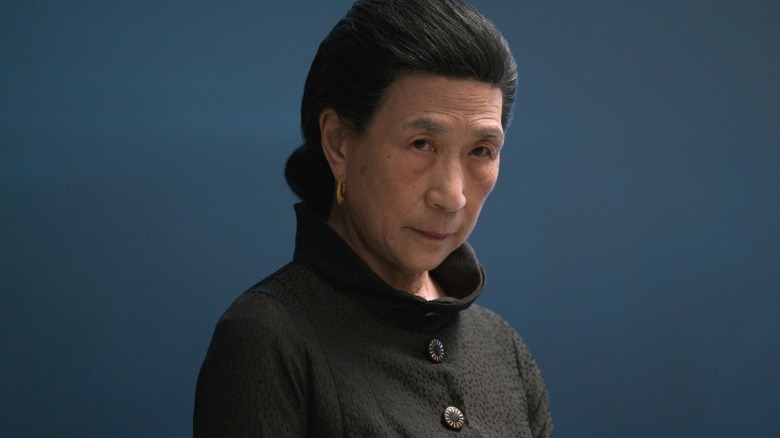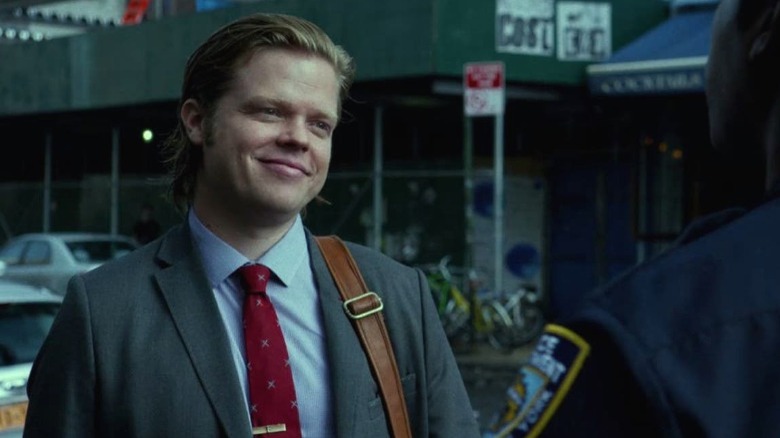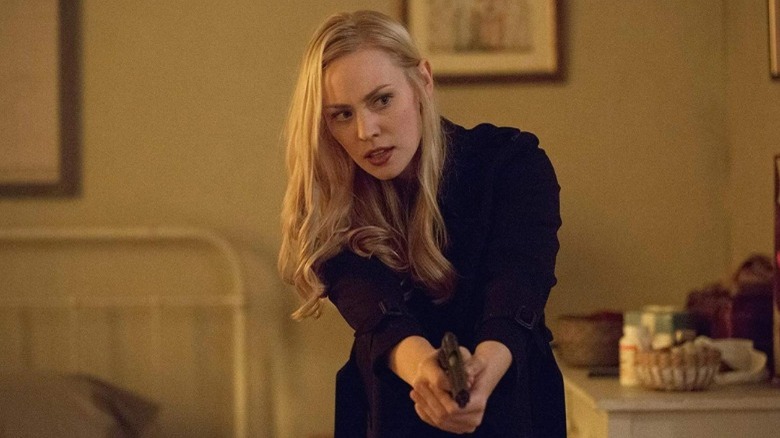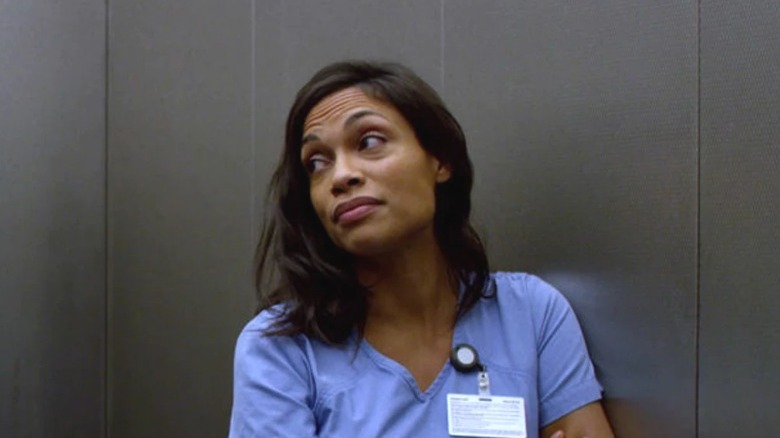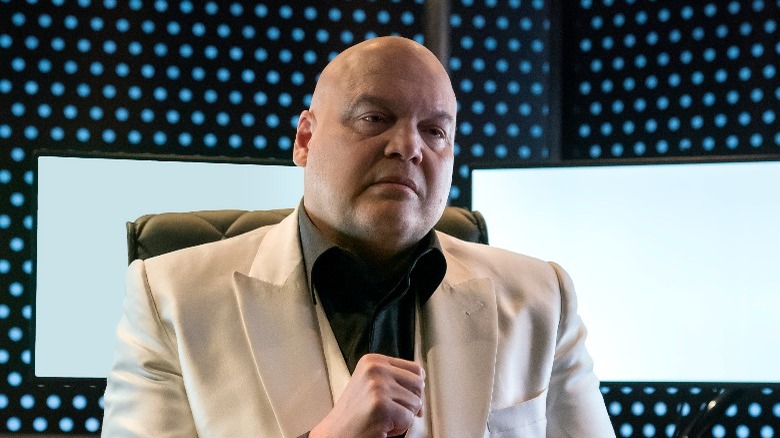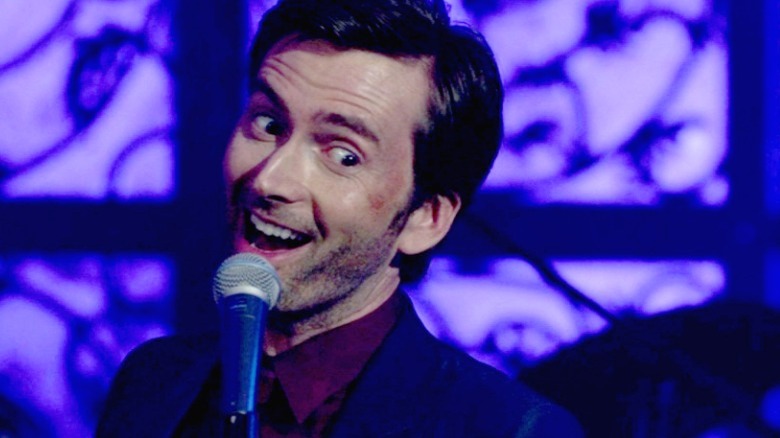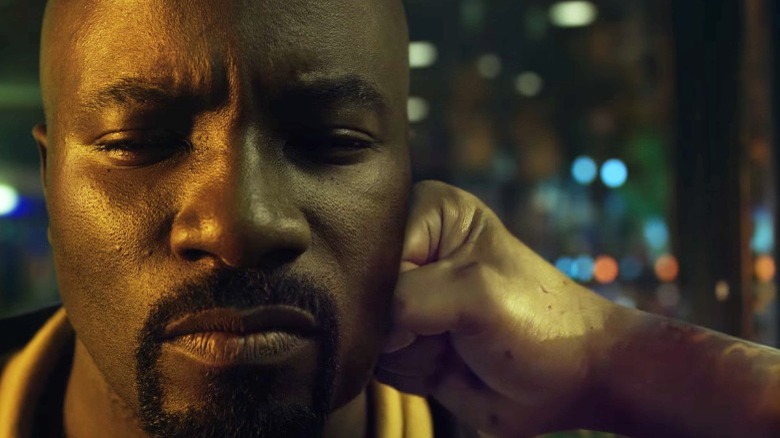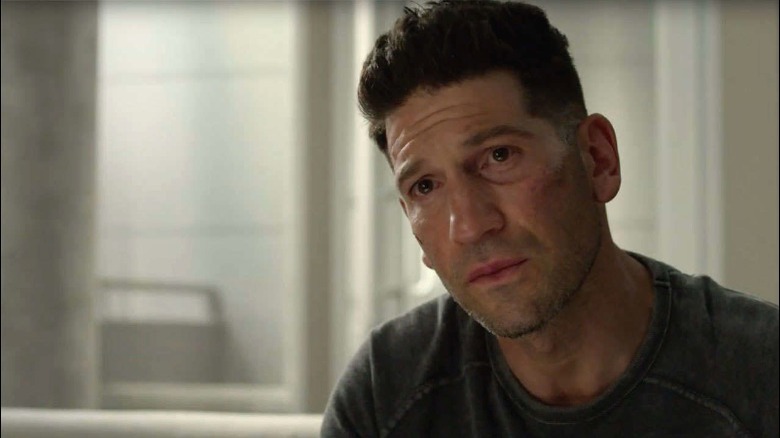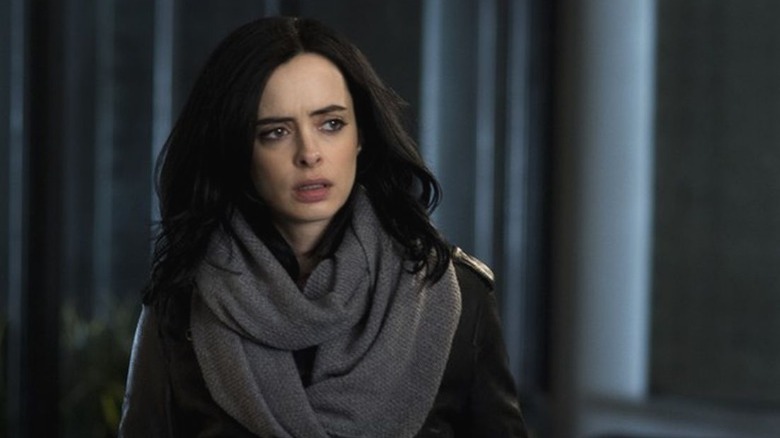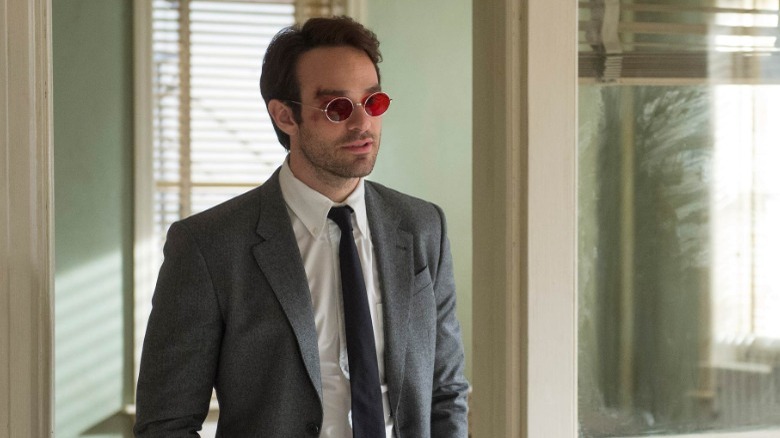The 15 Best Marvel Netflix Characters Ranked
While the era of Netflix-created Marvel content is over, the characters keep living on in our hearts. The Twitter hashtag campaign #SaveDaredevil has been running strong for more than two years, with "Daredevil" star Charlie Cox promoting it during his 2020 run on Broadway alongside "Loki" star Tom Hiddleston in the Tony-nominated play "Betrayal."
The glimpses of the multiverse in the first teases for "Spider-Man: No Way Home" keep the home fires alive for not just the return of Matt Murdock, but Jessica Jones, Luke Cage, and the rest of the Netflix mini-universe, though some big theories have already been shot down. While there's no confirmation yet that these characters will come back, much less be played by the actors who brought them to life on Netflix, there's always room for hope.
Ranking them is a subjective affair, of course, and for many of the Netflix characters, a lower rank isn't about the actor, but rather the hand they were dealt. Let's take a look back at our favorite heroes — and a few villains, too.
15. Danny Rand, Iron Fist
We said what we said, but it's difficult to defend Netflix's take on Danny Rand. Iron Fist creator Roy Thomas gives it a good shot, however. Finn Jones spends his two seasons limping through terrible fight choreography and a script that doesn't fit, well, much of anything. Visually, he's a good Iron Fist, and the contrast of his uptown life with Matt Murdock's grimier existence in the Hell's Kitchen neighborhood is nifty. But the glimpses of K'un-Lun were whelming at release, and the lush fantasy of "Shang-Chi" makes this secretive Chinese realm now look like the back seat of a '98 Camry.
The best part of Rand's existence is watching him get sandbagged by every other character throughout "The Defenders." On the bright side, there's a way to redeem "Iron Fist" in our hearts. Read "The Immortal Iron Fist" by Ed Brubaker and Matt Fraction, currently available in an omnibus collection, and, if you like, follow along as Marvel Comics prepares to reboot the character with a new identity this year.
14. Cornell Beltram Stokes, Cottonmouth
"Luke Cage" started off strong out the gate with the return of its titular character to his Harlem home. As he reasserts himself on the city streets, he quickly runs afoul of Cornell Stokes' criminal family. Cottonmouth isn't a fan of his nickname, but he does understand the cruel honor that underpins his industry. Yet he doesn't put it together that it's the results of his life's poisonous work that killed his childhood friend in his barbershop, and turns to vengeance and anger instead. His obsession with Luke Cage and the failure of a major weapons deal undoes him despite all the protections he built around himself.
Cottonmouth is a great character, played to almost "The Wire" levels of intensity by upcoming "Blade" star Mahershala Ali. The reason he's so low on this list? He's killed off halfway through the first season, and no other villain, not even Alfre Woodard as cousin Mariah Dillard, can measure up to the standard Ali set. Cottonmouth got a terrific send-off, but at too high a cost.
13. Alexandra Reid
When defining a character, the game is to try and describe them without limiting them to physical attributes. Who are they? What are they driven by? What is their backstory? "The Defenders" set its lead villain role in the rich co-founder of the Hand, Alexandra Reid. She's played by Sigourney Weaver, who is given enough motivation to be an elegantly evil Sigourney Weaver. Unfortunately, that's pretty much it.
Nominally, the quasi-immortal Reid has a connection to the exile of the Hand from K'un-lun, turning there for solace and learning. It's a mere plot point, used to explain why she gives a matronly rip about the deceased Elektra, and the whole thing about K'un-Lun's immortality elixir sets up why she suddenly has mortal motivations and gets to act like she's on a timer. She is. Otherwise, Alexandra looks fine as hell in a myriad of uptown stylings, with her hair on point and purring evilly in a way only Sigourney Weaver can.
12. Elektra Natchios
It's a fact of Elektra's comics history that she has to die and return to torment her old friends and her lover, Matt Murdock. It's one of the most iconic events in comics, and for good reasons. But Elektra's appearances in "Daredevil," set before her inevitable demise, shouldn't have felt like she was on a bullet-train ride towards destiny. It's rough trying to build up a character whose pop culture impact relies on being killed, and actor Élodie Yung does her best with what she's given (which isn't much, although it's still way better than what the character was handed in 2005's "Elektra").
Her post-resurrection scenes are much better, showing off her feral, unrestrained ability and the depths of her barely-understood rage. It's good stuff, giving her final disappearance at the end of "The Defenders" real weight and meaning. Chronologically, we should still be the early years of Elektra's journey, so here's hoping she gets another chance to shine.
11. Trish Walker
Trish spends her first few appearances in "Jessica Jones" setting herself up to be exactly what Jessica needs in a bestie. She's the '90s teen movie Anne Hathaway to Jessica's emo girl, peppy and upbeat. Comic fans knew there could be potentially much more to Trish than that, based on her own history as the superhero Hellcat. The seeds of her future are laid in the first season, when she has a fling with the abusive and heavily altered Will Simpson. But Netflix had its own ideas for this all-new take on Walker, and although the series tells an effective story, it's also tragic stuff.
Trish's journey is a bumpy ride. She does get the superpowers she seeks, but the cost to her psyche is high. She goes from joyful to vigilante hero to a terror in her own right. The Netflix era sees her a prisoner in the Raft, one of the few places where an empowered individual can be safely incarcerated. It'd be a terrific place to jumpstart a new story for Trish Walker, leading to a potential return to heroism.
10. Madame Gao
Marvel has gone through it when updating its heroes and villains to acknowledge the flaws in past storytelling, and its various tries, from the Ancient One to Xu Wenwu, reveal varying levels of success. The Netflix mini-universe didn't shy away from attempting to showcase a variety of Asian themes without resorting to bland stereotypes, and Madame Gao, an original character slightly based on the Crane Mother from the "Immortal Iron Fist" comics, is a solid try.
Delightfully portrayed by Wai Ching Ho, Madame Gao leans into the elder mystic stereotype when it suits her. But she's one of the most ruthless leaders of the Hand, another near-immortal exile of K'un-Lun who's first seen running the drug trade through Hell's Kitchen on "Daredevil." She's one of the most intriguing threads found in the Netflix universe, and it's a small shame that she joins the rest of the Hand in a final defeat in the climax of "The Defenders." We might not have seen a body, but we did probably see the last of this fascinating character.
9. Franklin 'Foggy' Nelson
There are moments during Netflix's "Daredevil" when one can forget the name of the show and think we're watching a drama about the misadventures of a well-meaning New York lawyer named Foggy Nelson. But Elden Henson is so fecklessly charming that the amount of focus he gets is entirely forgivable. Everyone, even the most devout, need a break from the deeper musings of Murdock's struggle with his Catholic fate, and Foggy is the guy who'll get the takeout and tell a story about the funniest way he's ever been shot down in a bar.
Foggy is just a nice dude, and although his boundaries aren't as tight as they should be, it's both wrenching and necessary to watch him tell Matt where the line is. After popping up a variety of times throughout the Netflix universe, "Daredevil" sees him shoot for the moon in its final season, taking a shot at the district attorney's office. Though it doesn't pan out, it does pave the way for the law office of Nelson, Murdock, and Page to reopen.
8. Karen Page
Karen Page could have been like some one-off "Law & Order" character that suddenly proves crucial when on the witness stand, and we're originally made to think of her pretty much like that. But she's dogged when she's curious, and she's made of hardier stuff than she lets on. Deborah Ann Woll is excellent at acting like the impressionable waif many take Karen Page for, but this young woman eventually turns herself into Frank Castle's moral center, much to his own surprise and dismay.
Karen may be one of Daredevil's love interests in comics, but her dynamic with Frank is one of the best things to come out of the Netflix series. Not only does it give him an anchor to keep him sympathetic, but Karen comes out of his story stronger than ever. Like Foggy Nelson, but wiser, she finds her boundaries and sticks to them. With a return to the law office in her unfinished "Daredevil" future, it would be a delight to see her come back as she is, underestimated yet complicated.
7. Claire Temple
Sometimes, in real life, we have someone that becomes the glue holding everyone else together, no matter the hurdles or the distance between us. It's that human connection that turns local New York nurse Claire Temple into the unlikely thread that connects almost the entire Netflix mini-universe. She's hardy and unflappable, empathetic without being anyone's doormat. Though she's based on a character from Luke Cage's "Hero for Hire" era, there's also a solid bit of the Night Nurse in her, the superhero-specialist medical professional who provides the basis for Claire's counterpart, Dr. Palmer, in "Doctor Strange."
Rosario Dawson keeps Claire relatable. She's not a hero, but a tired young woman working a hard job. When the vigilante hijinks of one neighborhood begin to be too much for her, she goes elsewhere in the city, only to find the same struggles, and the same need for help. It's bittersweet that her relationship with Luke Cage is frayed by the end. Without Claire, it's not the same neighborhood anymore. But that's change, like it or not.
6. Wilson Fisk, the Kingpin
Vincent D'Onofrio is a wildly good character performer, the sort of fixture that's so competent and integral to the work that he often goes ironically forgotten in discussions of underrated actors. As Wilson Fisk, the intelligence, brutal anger, and paradoxical sweetness all combine to create a person we fear, hate, and even root for. Fisk is the sort of underworld criminal we can appreciate. He has a code of honor, and there's a method to his viciousness that makes him reasonable even when there's no doubt that he's on the shady side of being a true monster. There's logic to him, in defiance of real-world cruelty.
Fisk, unlike many of the Netflix characters, is content to remain Daredevil's problem. Although he drifts through the same alleys as the Hand, his interests are specific and his ire is targeted. He has one weakness, his earnest love for Vanessa, the art gallery owner who charms him to his soul. Not to put too fine a point on it, but if D'Onofrio doesn't get at least a voice cameo in "Spider-Man: No Way Home," it's a loss for Marvel as a whole. This is the best portrayal of Wilson Fisk to date, and we deserve more of him.
5. Kilgrave
The original Purple Man is one of those daft '60s comic characters whose first issues, by rights, should have ended up in the dusty bargain bins of history. And yet, once the potential terror of his ability was understood, decades later, writers began to use him effectively. He became a scarcely utilized horror, even manipulating a version of Cable to the edge of apocalypse.
By ditching the purple skin and casting the boyishly charming David Tennant as this unlikely core villain of "Jessica Jones," Kilgrave became a monster that mattered. He's a supervillain, but he's all too real. As a normal-looking guy with an abnormal sense of humanity, Kilgrave becomes every gaslighting partner, every stalker, every attacker. He has nearly irresistible psychic control over his victims, but for many, that's only a metaphor for the very real power their abusers hold over them. That his grasp on Jessica feels like it lingers long after his death is equally powerful a metaphor. It doesn't cure the damage he did. But hey, it's a start.
4. Luke Cage
Luke Cage, hero for hire, the protector of Harlem. It's a grim reflection, not a joke, that Black America needs bulletproof heroes to look up to. "Luke Cage" updates its eponymous hero from his Melvin Van Peebles-inspired origins into something that more closely reflects today's experiences. Luke's origin story, neighborhood, and group of friends comes to Netflix relatively whole, but what it all means is much more personal.
First appearing in "Jessica Jones," Mike Colter's wry but determined take on Luke makes him the life of "The Defenders," a stable figure caught between the rest of the bickering team. Opinions on his fate in the final season of "Luke Cage" vary, and his role as the new keeper of Harlem's streets after the death of crime lord Mariah Dillard could go either way. It's an interesting place to leave Luke, and although Colter is currently enjoying success on the Paramount+ series "Evil," Luke Cage will always find a warm welcome home.
3. Frank Castle, the Punisher
There's some willful mainstream ignorance about who the Punisher is and what he's about, but the nice thing about Gerry Conway, John Romita Sr., and Ross Andru's classic antihero is that he actively loathes that kind of ignorance. Frank Castle isn't an avatar for aggrieved and privileged Americans. He's a viral response to a diseased system. In a better world, his military wouldn't have abandoned him, his family wouldn't have been killed, and he wouldn't be on the streets, doing what he does. But this isn't that world, is it?
Jon Bernthal gives Frank the seething sense of a wounded animal, but there's a calmer side to this version of the Punisher, too. His interactions with Karen Page remind him that he's human, if almost against his will, and that the things he does are violent and inhumane. We still have a lot of fondness for Thomas Jane in the 2004 film and the "Dirty Laundry" bootleg short, but Bernthal had a chance to explore who Frank was under the blood and anger, and the series did great by him.
2. Jessica Jones
If Lisbeth Salander, the complicated star of "The Girl with the Dragon Tattoo," was given superhero powers and some effective therapy, she'd be Jessica Jones. Jessica, for all her flaws and self-destructive behavior — or perhaps, because of them — is someone we can understand and empathize with. She's in a crappy position. She's an unwilling superpower and an abuse survivor, and sometimes she's not really sure about who she is beyond all of that.
Jessica is also someone that tries to do her best, even when she acts like she doesn't want to. It doesn't always work, and she takes her failures to heart. It's the kind of character that could come off edgelord emo all the time, but Krysten Ritter keeps Jessica grounded, funny, and human. The anger she always carries is tangible and well-earned, but it's also not always in control of her. Her last appearance sees her defy the ghost of Kilgrave and choose her own path, another step towards reclaiming her life. That's a major turn for Jessica. It's a shame we haven't yet seen what she could do next.
1. Matt Murdock, Daredevil
Bringing Daredevil to life again after the sting of the 2003 Ben Affleck film was a risky endeavor for Netflix. Yes, the film isn't that bad, helped by a superior recut that hit DVD a year later. But "Daredevil" quickly set its own tone, with a grittier dive into Murdock's moral complexities and questions of faith. It's Netflix's "Iron Man," a surprise success that catapulted their corner of the Marvel franchise into something that fans identified as special.
Charlie Cox, who had the talent to hit it big years ago, shines as the blind legal eagle with a weird night time hobby. Without him, the entire Netflix Marvel franchise falls into a dumpster. Instead, poor Matt falls into that dumpster repeatedly, as is his due, clambering out to delight us with another long-take fight in a hallway and to be Catholically tortured about how badass he is. The weight of his actions is something he has to balance, and he doesn't always succeed. We could continue to wax lyrical about him, but look, just #SaveDaredevil and give Charlie that phone call. He deserves it, and we deserve it.
